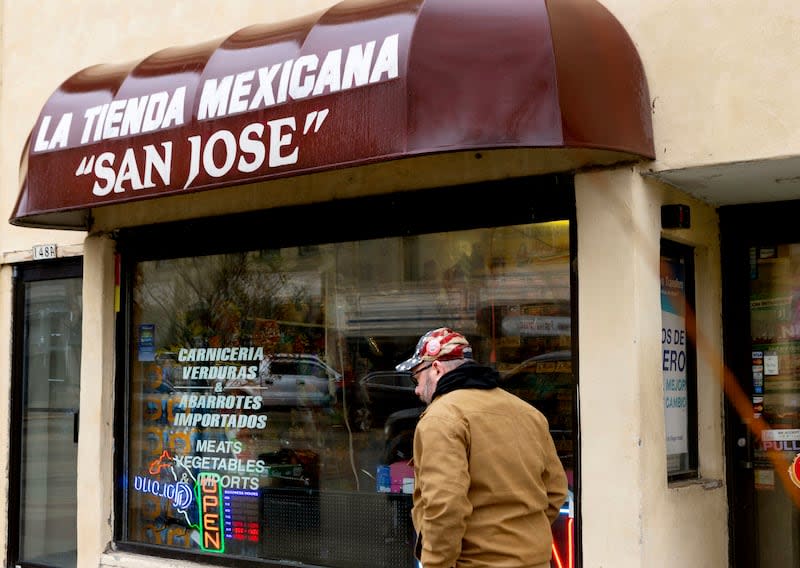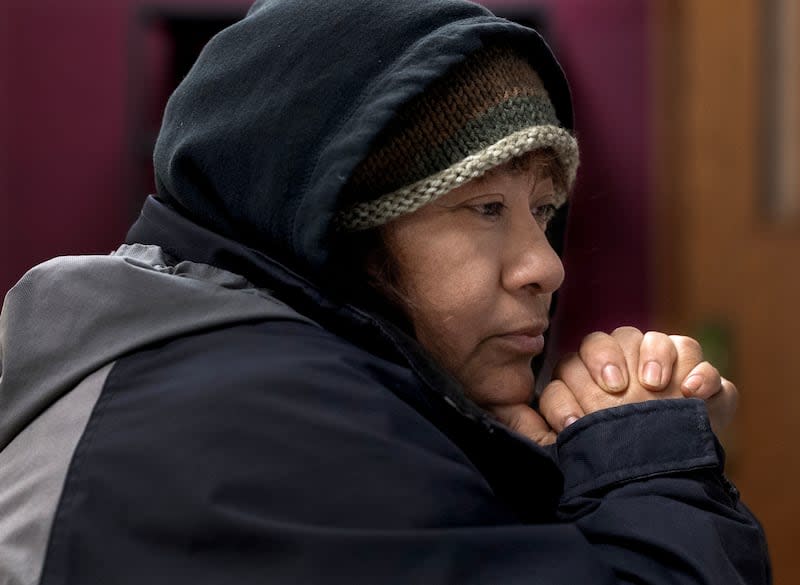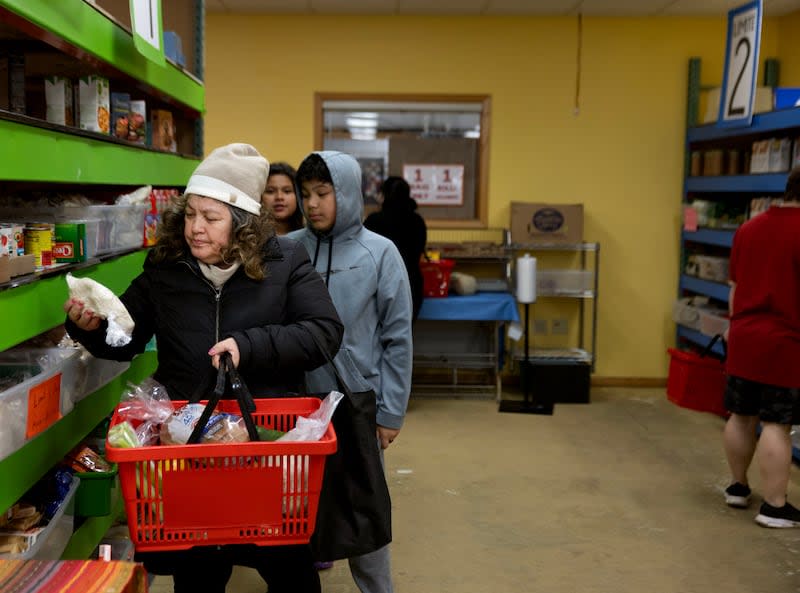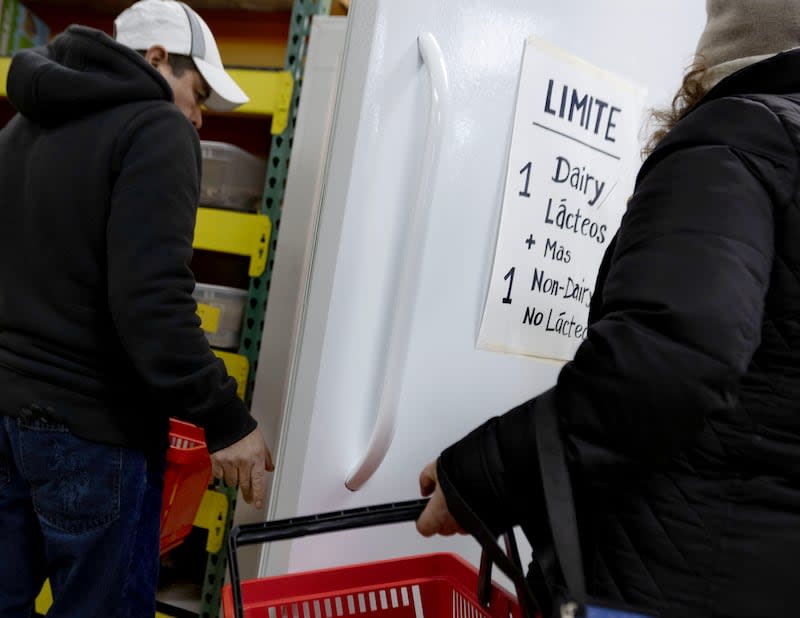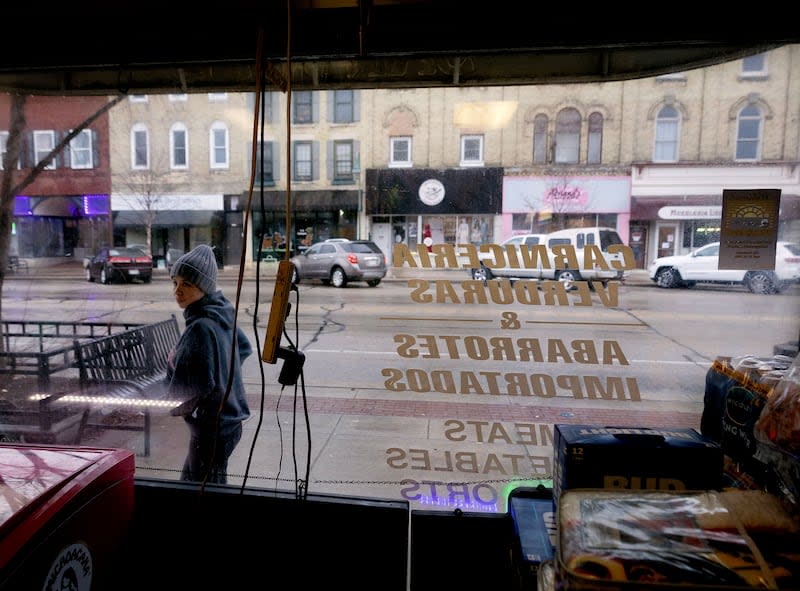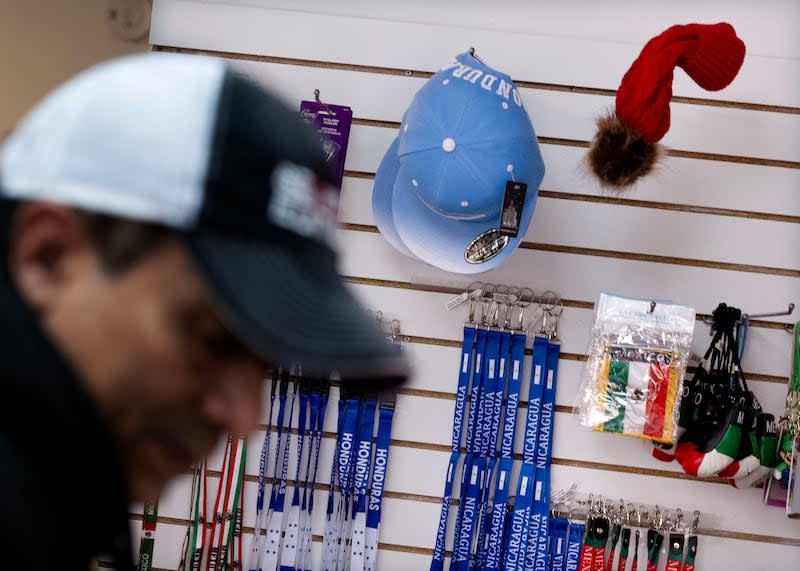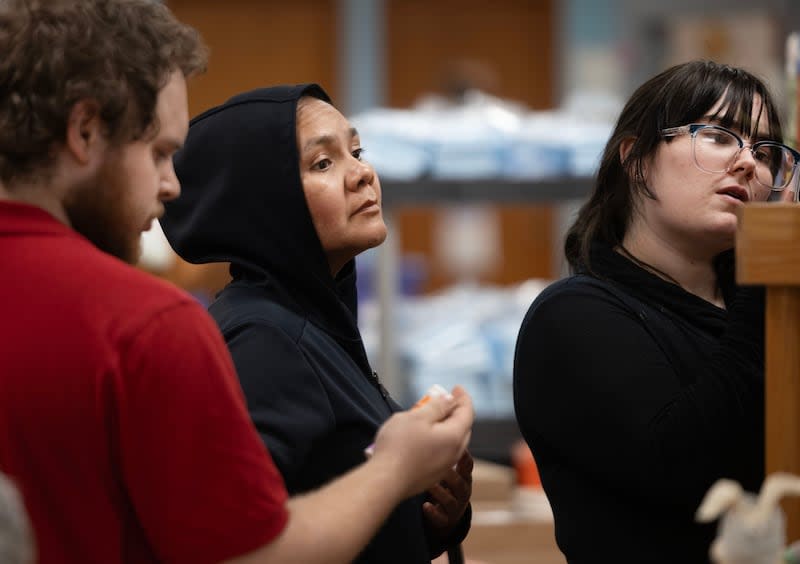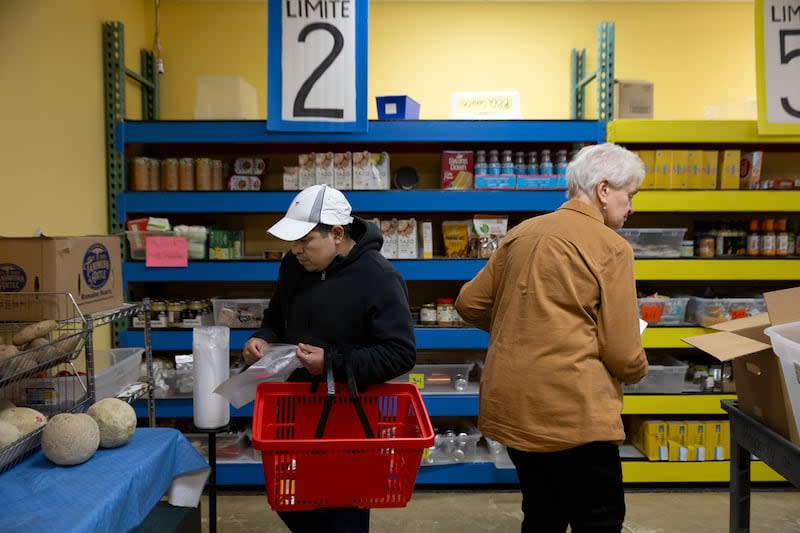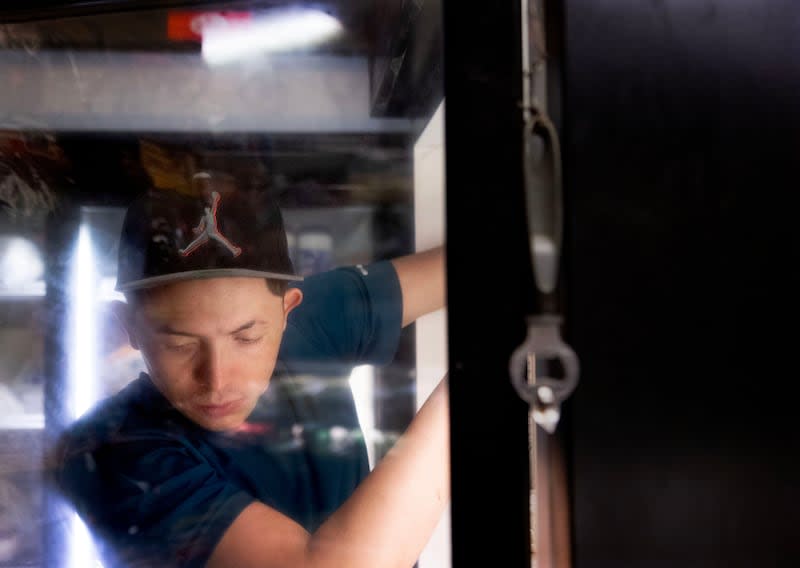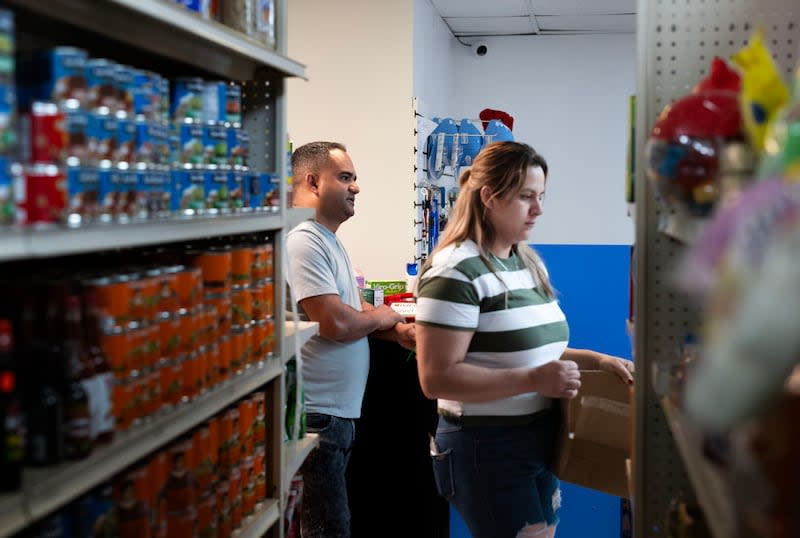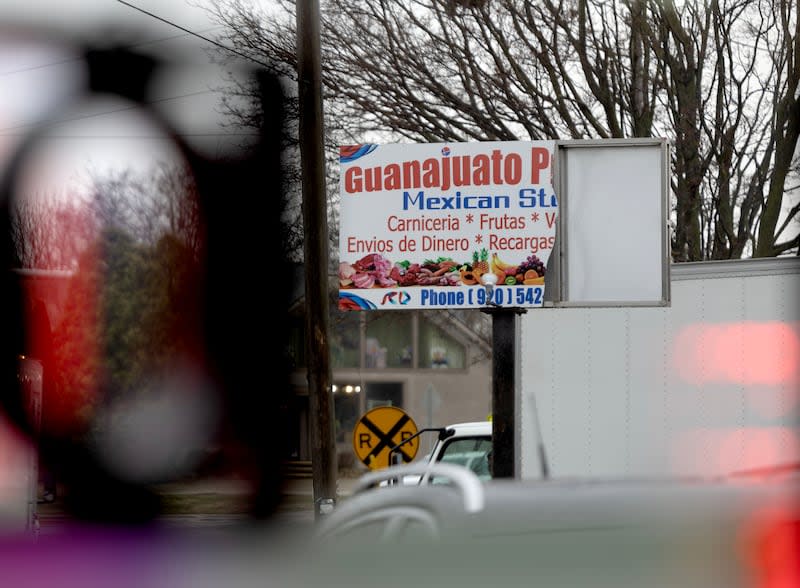Trump said immigrants ‘inundated’ this tiny town. Here’s what residents say
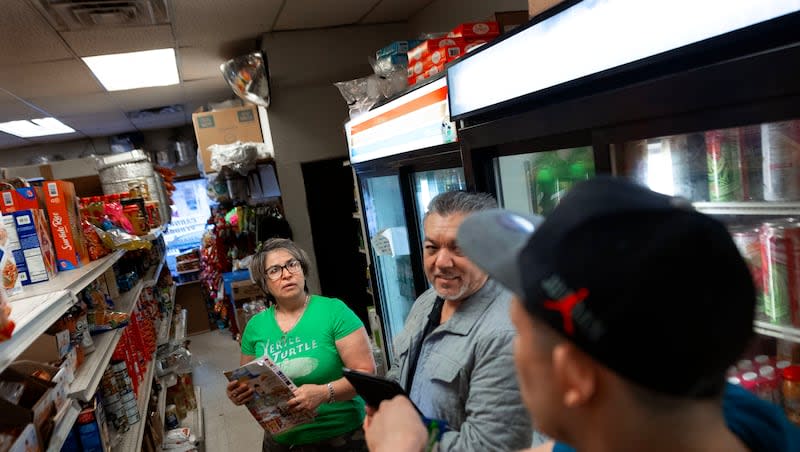
- Oops!Something went wrong.Please try again later.
Everyone in town quickly learned about the meeting, but no one seemed to get an invitation. In a feels-smaller-than-it-is community like Whitewater, Wisconsin, population 15,000, home of a Division III university and not much else, word travels fast. First, whispers of a U.S. representative in town. A U.S. senator, too. They held a closed-door “press conference” at the city building with the police department and some city officials too. And in that press conference, they declared sleepy Whitewater the epicenter of America’s immigration crisis.
In late November, sitting at a semicircular table, Sen. Ron Johnson and Rep. Bryan Steil, both Wisconsin Republicans, warned of the “flood of illegal immigrants” coming to America. They lambasted big cities — like New York and Chicago, just two hours south — for being hotbeds of immigrant-driven crime. And they warned that the same was quickly happening in Whitewater. “We see on the national TV how it plays out in (major) cities,” Steil said. “But I think it’s important that people understand the impact that it’s having in smaller communities as well, in particular this community here in Whitewater.”
The declaration came as a surprise to some longtime residents. Whitewater had been dealing with demographic change for some time, but few were labeling it a “crisis,” like Johnson had. Sure, a handful of new bodegas with Spanish-language signage had popped up on the main drag, and the evening adult ESL classes at the local high school were full. But to others it didn’t feel out-of-the-ordinary. “When the press conference came out,” Roni Telfer, a resident of 39 years, told me, “most people in the community reacted, ‘What immigrants?’”
The conference proved to be just the tip of an unruly, and widely unwanted, iceberg. Three days after Christmas, the Whitewater police chief sent a letter to the White House highlighting the “major challenges” accompanying the immigrant surge. The letter estimated that “roughly 800-1,000 individuals” from Nicaragua and Venezuela had come to Whitewater over the previous two years. It highlighted some of the challenges that resulted, like English-speaking officers being unable to communicate with immigrants and new arrivals over-occupying housing units.
The letter leaked to the press, and a barrage ensued. First, conservative news outlet Breitbart published a story with the headline, “Biden Floods Small Wisconsin Town with 1,000 Migrants.” Other news coverage followed, with the most provocative lines from the police letter: an immigrant family was found “living in a 10′x10′x shed in minus 10-degree weather”; a kidnapping; and multiple sexual assaults “linked to immigrants in some manner.” The letter included a disclaimer: “None of this information is shared as a means of denigrating or vilifying this group of people,” it read. “With that said, we are in dire need of additional resources.”
By early April, Whitewater was part of national political attack lines. “Look no further than the tiny town of Whitewater, Wisconsin,” Trump declared at a rally in Green Bay on April 2. “Their town is becoming a hotbed of cartel activity and illicit drugs, like no one has ever seen before.” (The police letter makes no mention of cartels or drugs.)
Truth be told, no one really knew the extent of the immigrant surge. The police estimate — that between 800 and 1,000 new immigrants had arrived in recent years — was said to have been extrapolated from a growth of Spanish-language students at the public schools. Others estimated fewer.
On the ground, the city’s disparate groups tried to cope. The police department begged for more resources, amid an uptick of unlicensed motorists and little ability to communicate with them. The city struggled to keep up with the housing demand. The schools navigated the unique challenge of an increase in students who don’t speak English. Nonprofit groups adjusted to the increased food and clothing needs. And the city’s new arrivals, the Nicaraguan mothers and the Mexican children and the Venezuelan working-age men, all looking for a better life 1,400 miles from the Mexican border, found themselves at the center of a political firestorm.
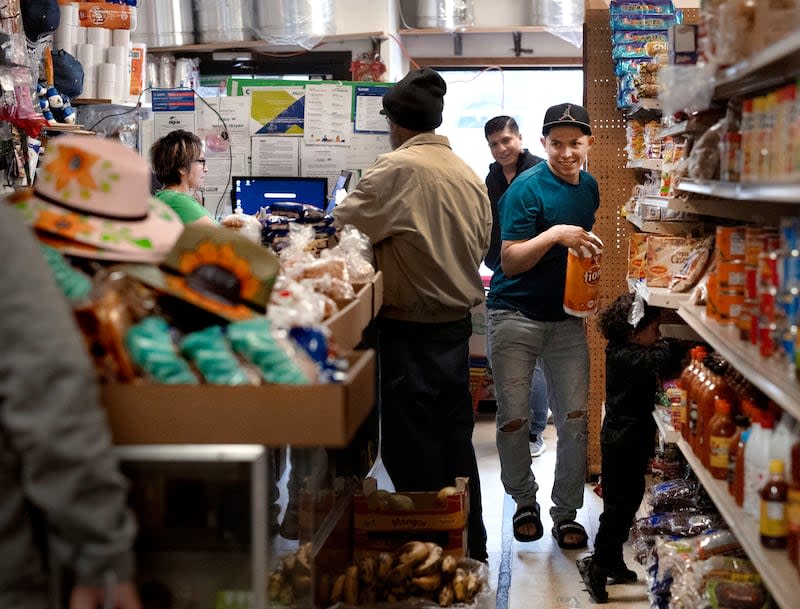
“This was supposed to be a Mexican store,” Juana Barajas told me, pointing to the rows and rows of canned goods and cheeses. In the back, a worker flipped fresh tortillas; at the register, a pair of young Nicaraguan men transfer cash back to their families. Barajas has owned this store, the Tienda Mexicana San Juan on Whitewater’s Main Street, for over 20 years. The goal was to serve the Mexican community in Whitewater, to give them a taste of home.
“Before COVID, our products (were) 100% Mexican,” she explained. Now, the pastries are labeled: the conchas, with a small Mexican flag sticker on the wrapping; the cosa de horno, with a Nicaraguan flag. “We have a lot more Central American things now.”
It’s a microcosm of the growth of the Latino population in town, something that Barajas sees firsthand. As one of the city’s first Hispanic immigrants, she serves as something of an unofficial mentor to the new arrivals, she says. She tells them where to look for jobs and how to stay out of trouble. “I don’t know all the laws, but I’ve been here a long time,” she said. “That’s how we are. We help each other.”
The biggest problem immigrants face in Whitewater might be transportation. There is no public transit, and the for-hire taxi services are sporadic and costly. Undocumented immigrants in Wisconsin were able to get driver’s licenses until 2007, when a federal law reversed the policy. That leaves many undocumented immigrants in Whitewater driving illegally, and the local police struggling to manage the situation. In the state legislature, some longtime opponents to immigrant driving privileges are coming around. (“If we suddenly kicked out all of the people here, the undocumented, our dairy farms would collapse,” one lawmaker told ProPublica.) But in Whitewater, the problem is more acute: people need to get to work.
From Barajas’ perspective, the solution is simple. “Give them licenses, and they’ll be more careful,” she said. But even she recognizes that the past two years, more so than any span during her time here, have been different. There are more immigrants in town than she’s ever seen. The pandemic was the genesis: stores shut down, factories slowed, people stayed inside. Then, in late 2021 and early 2022, as the economy crept back to life, there was a huge labor shortage in south-central Wisconsin’s chief industries: manufacturing and agriculture. Whitewater, located centrally between Milwaukee and Madison, is surrounded by a number of smaller factory and farming towns. For decades, it’s been a hub for migrant workers like Barajas, though in modest quantities. In 2022, small groups of workers from Nicaragua and Venezuela arrived, filling the jobs and assuaging Wisconsin’s post-pandemic economic recovery. They brought friends and family. And on and on.
Barajas first noticed the changes when Nicaraguan and Venezuelan people came into her store, looking for items she didn’t have. She began placing orders for goods she’d never heard of, out of popular demand, and couldn’t keep the shelves stocked fast enough. Javier Martinez, owner of Guanajuato Produce down the street, described a similar phenomenon.
Barajas eventually hired a young man, Janier Efrain Montenegro Flores, from Nicaragua, to help navigate her new customers’ needs. It’s a mutually beneficial bargain — Barajas gets someone who understands the new arrivals, and Montenegro Flores gets a stable job in a stable country. “The people here are very kind,” Montenegro Flores told me. “This is the fight for my dreams.”
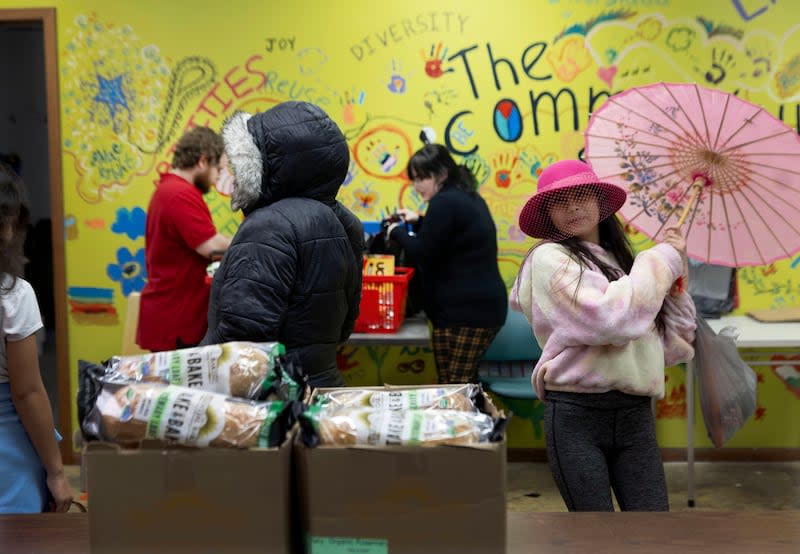
Shortly after the Johnston-Steil press conference in November, a group of concerned Whitewater citizens decided to respond. Jorge Islas Martinez led the charge. An immigrant from Mexico, Islas Martinez has overseen an adult ESL program in the city for the past 25 years. He put together an eclectic group: local business leaders, teachers, nurses, retirees, a city council member. If the police department and the city are struggling with this influx, they reasoned, we should find a way to help. And as chief priority, they should make these new neighbors feel at home. “We’re just a group of people who care,” said Marjorie Stoneman, one of the group’s members. “It’s a group that tries to welcome people.”
On a recent Wednesday night, the “Immigration Support Group,” as they called themselves, huddled for its weekly meeting. The physical space is nothing special — a spare room off the public library’s main foyer, with drop ceiling tiles and a cacophony of oddly-shaped black-and-white images plastered on the walls. Twenty-five people sat along long folding tables, arranged in a square, so they could each see one another.
Islas Martinez called the group to order. “We really have a great community here,” Islas Martinez said, smiling. “Very generous.” The room echoed in agreement.
Islas Martinez reported about a recent meeting with the city manager. It was productive, he said. The city wasn’t aware of the police department’s letter until afterward, and “they didn’t know the pain it would cause.” Islas Martinez was pleased to announce that the city manager had released a statement disputing Trump’s comments at his rally, reiterating the city’s “commitment to serve all who reside in or come to Whitewater.” (The city manager did not respond to the Deseret News’ request for comment.)
“We told the city that respect is one of the most important elements,” Islas Martinez said. “Respect will help us build trust, and trust will help us build unity.”
Over the subsequent hour, the group led out in what can best be described as a immigrant-focused triage session. One attendee reported that the city had created QR codes, to be placed throughout the library and other public spaces, that redirected to a Spanish-language website full of resources for immigrants. Another reported a multithousand-dollar donation to the ESL program. Another mentioned the upcoming 25-year anniversary gala for the ESL class, and requested that all immigrants be involved. Another mentioned a pro-bono lawyer who would be visiting the city and requested it be advertised. Another talked about a local church’s desire to bus immigrants, free of charge, to a Milwaukee Brewers baseball game. And on and on.
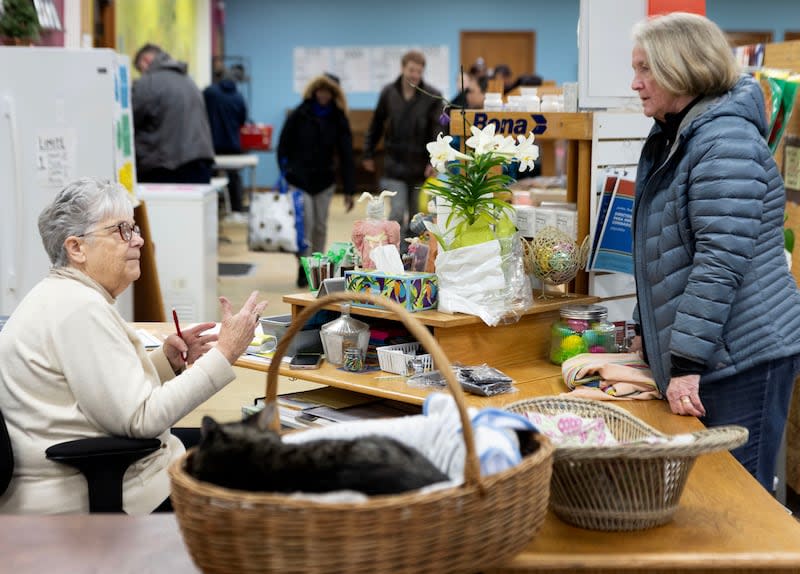
This is what Whitewater does best, said Roni Telfer, a longtime resident. “There’s an issue, and they find a way to get at it as a community,” she said. Twenty years ago, there was a homelessness issue in town; an ecumenical group linked arms to form the Bethel House, a resource center for people experiencing homelessness. More recently, when gang activity ticked up, the school district began investing in after-school programs, college-preparedness initiatives and extracurriculars. Before long, the gang issue dissipated. “I don’t know if I could show you data to that effect, but you could sure see it,” Telfer said.
The same thinking went into bolstering the school system’s ability to serve Spanish-speaking students. Whitewater School District has maintained an ESL program for decades; of its nearly 2,000 students, around 350 at any given point have been non-English speakers. Over the last two years, that group has grown. “It’s always a challenge to hire bilingual staff,” Lanora Heim, the district’s director of pupil services, explained. And even those who could communicate fine with the Mexican students struggled with Nicaraguans or Venezuelans.
So, the school district started bringing in teachers through Wisconsin’s guest teacher program, an initiative that provides visas for non-American teachers to work in public schools for a limited time. So far, Heim said, Whitewater has hired teachers from El Salvador, Ecuador and Nicaragua. To help manage the effects of immigration, Whitewater has encouraged more immigration.
“There’s a lot more good happening here than bad,” Heim said.
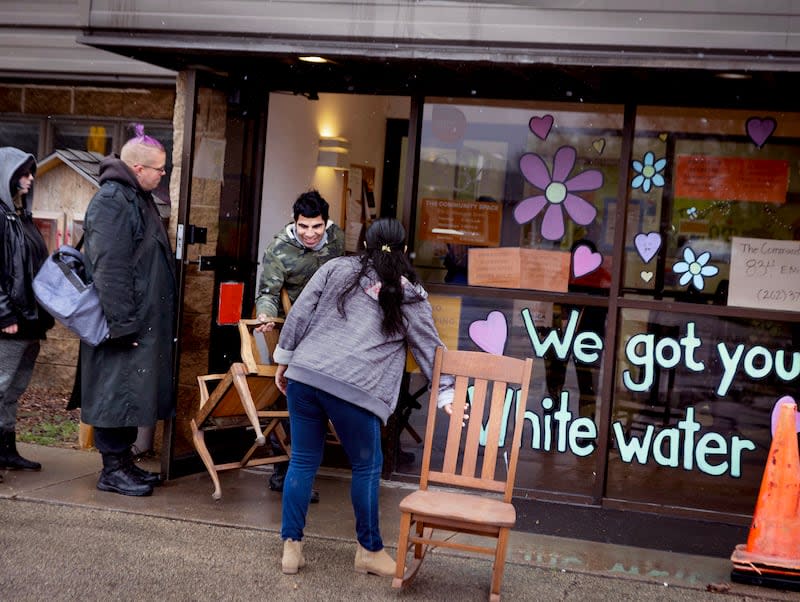
Is it possible that the first step to fixing America’s immigration crisis is extending an open arm to the immigrants themselves? “When all the kerfuffle first happened, I realized, I can’t do anything about the grandstanding at the border; I can’t do anything with the stalemate in Congress; but I can do this,” Kristine Zaballos told me. “Look around your community, and do what you can.”
To Zaballos, doing what she can means spending two nights a week at the Community Space, an old warehouse-turned-resource center for anyone in need, just a few blocks off Whitewater’s main thoroughfare. In true Whitewater fashion, it started as a solution to a specific problem — a janitor at the elementary school, years ago, saw kids without coats — so he began opening the school lunchroom on Saturdays, blanketing the tables with donated jackets. People could enter and take whatever they needed. The operation soon outgrew the lunchroom and moved to the First United Methodist Church. It outgrew that space, too, and moved to the Congregational United Church of Christ. Eventually, a generous local businessman offered an empty warehouse. “We didn’t know what to do with all the space,” said Kay Robers, one of the Community Space’s cofounders.
Before long, the space filled up. The local Sears donated its excess display racks and chairs. Walmart, KwikTrip, Whole Foods and Feeding America brought food. (They still do, two or three times a week.) Residents brought gently used clothing, furniture, bedding, books and games. On any given night, 30 to 40 cars pull around the back of the building, filling the loading dock with donated goods. “People will bring new stuff,” Valentín, one Community Space volunteer, said. (He didn’t share his last name.) “Like, ‘I saw a deal and thought of you.’ And they bring this stuff, with the tags on.”
When new immigrants arrive to Whitewater, they’re immediately pointed to the Community Space — el regalón, they call it, “the great giver.” It’s not hard to see why. Every 15 minutes, 20 people are allowed inside, to prevent crowding. They are handed a small shopping basket. And then they are free to take whatever they need: shelves stacked with food; racks upon racks of clothing; sports equipment or lawn chairs. “They don’t pay anything,” Robers said. All they provide is their ZIP code, the number of people in their family, and the weight of their food (for the Community Space’s own records). There’s another food bank in town, but it requires customers to prove they live in Whitewater. Many of these immigrants don’t have ID or proof of residence, and might feel uncomfortable sharing it even if they did. “All we want to do is feed them and keep them warm,” Robers said. “That’s it.”
Robers can always tell when immigrants have just arrived to Whitewater. They often arrive in flip-flops or pajamas, not knowing what kind of weather to expect. They fill their basket with potato chips, water or soda, nothing else. “Those are the only things they recognize,” Robers said.
Robers is the one who shows up to unlock the door and flip on the lights. When a line of people snakes out the door, she’s the one waving them in and weighing their baskets. “Have we had to adjust? Yes, we’ve had to adjust,” she said. “But that’s no crisis. It’s no different than my Norwegian great-grandparents coming here a century ago.”
On a recent Wednesday, less than 24 hours after Trump declared Whitewater in crisis, the Community Space was buzzing. Valentín, the volunteer, helped a small family carry a basket — immigrants helping immigrants. A man walked out with a large wooden dinner chair. In the corner, a woman, María Torres, sat at a table, her hoodie pulled over a beanie. She came from Mexico a year ago, when jobs were plenty and the weather good. Things have soured — as more and more immigrants move in, she’s found less work. “I’m going to fight a bit longer,” she told me, “but I’m thinking I want to leave.”
She paused, surveying the room. Kristine Zaballos was zipping around the room, answering questions and waving people in. Kay Robers was sitting at the table, smiling. Torres smiled, too. “It’s not everywhere that they offer help like this,” she said. “It really is a blessing.”
